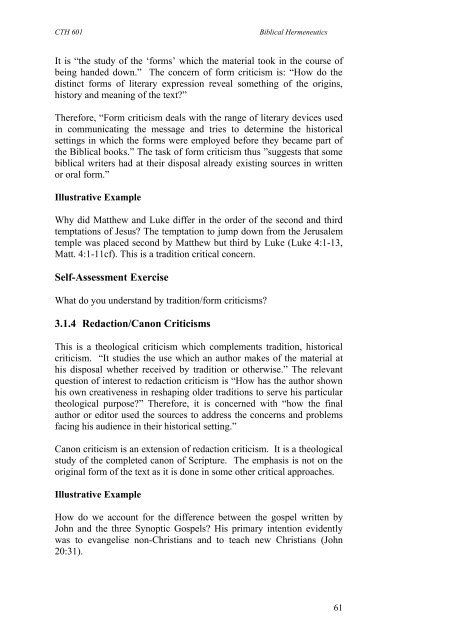Biblical Hermeneutics - National Open University of Nigeria
Biblical Hermeneutics - National Open University of Nigeria
Biblical Hermeneutics - National Open University of Nigeria
You also want an ePaper? Increase the reach of your titles
YUMPU automatically turns print PDFs into web optimized ePapers that Google loves.
CTH 601 <strong>Biblical</strong> <strong>Hermeneutics</strong><br />
It is “the study <strong>of</strong> the ‘forms’ which the material took in the course <strong>of</strong><br />
being handed down.” The concern <strong>of</strong> form criticism is: “How do the<br />
distinct forms <strong>of</strong> literary expression reveal something <strong>of</strong> the origins,<br />
history and meaning <strong>of</strong> the text?”<br />
Therefore, “Form criticism deals with the range <strong>of</strong> literary devices used<br />
in communicating the message and tries to determine the historical<br />
settings in which the forms were employed before they became part <strong>of</strong><br />
the <strong>Biblical</strong> books.” The task <strong>of</strong> form criticism thus ”suggests that some<br />
biblical writers had at their disposal already existing sources in written<br />
or oral form.”<br />
Illustrative Example<br />
Why did Matthew and Luke differ in the order <strong>of</strong> the second and third<br />
temptations <strong>of</strong> Jesus? The temptation to jump down from the Jerusalem<br />
temple was placed second by Matthew but third by Luke (Luke 4:1-13,<br />
Matt. 4:1-11cf). This is a tradition critical concern.<br />
Self-Assessment Exercise<br />
What do you understand by tradition/form criticisms?<br />
3.1.4 Redaction/Canon Criticisms<br />
This is a theological criticism which complements tradition, historical<br />
criticism. “It studies the use which an author makes <strong>of</strong> the material at<br />
his disposal whether received by tradition or otherwise.” The relevant<br />
question <strong>of</strong> interest to redaction criticism is “How has the author shown<br />
his own creativeness in reshaping older traditions to serve his particular<br />
theological purpose?” Therefore, it is concerned with “how the final<br />
author or editor used the sources to address the concerns and problems<br />
facing his audience in their historical setting.”<br />
Canon criticism is an extension <strong>of</strong> redaction criticism. It is a theological<br />
study <strong>of</strong> the completed canon <strong>of</strong> Scripture. The emphasis is not on the<br />
original form <strong>of</strong> the text as it is done in some other critical approaches.<br />
Illustrative Example<br />
How do we account for the difference between the gospel written by<br />
John and the three Synoptic Gospels? His primary intention evidently<br />
was to evangelise non-Christians and to teach new Christians (John<br />
20:31).<br />
61

















